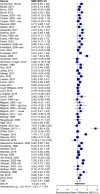Effects of psychological treatment for depression among people not actively seeking help: a meta-analysis
- PMID: 36404636
- PMCID: PMC9899569
- DOI: 10.1017/S0033291722003518
Effects of psychological treatment for depression among people not actively seeking help: a meta-analysis
Abstract
Although psychological treatments have been found to be effective for depression in adults, many individuals with depression do not actively seek help. It is currently unclear whether psychological treatments are effective among those not actively seeking help. Besides, little is known about the proportion of patients who completed a screening questionnaire who end up in a clinical trial. Therefore, we conducted a meta-analysis of 52 randomized trials comparing psychotherapies for adults with a diagnosis or elevated symptoms of depression against control conditions (care-as-usual, waiting list, and other inactive treatment). Only studies recruiting participants who do not actively seek help (participants who have been recruited through screening instead of advertisements and clinical referrals) were included. To obtain an overall effect estimate of psychotherapy, we pooled all post-test differences with a random-effects model. We found that psychological treatments had a moderate to high effect on reducing depressive symptoms compared to control groups [g = 0.55; 95% confidence interval (CI) 0.41-0.69]. Heterogeneity was high (I2 = 75%; 95% CI 68-80). At 12 months' follow-up, the effects were small but significant (6-8 months: g = 0.33; 95% CI 0.14-0.52; 9-12 months: g = 0.24; 95% CI 0.11-0.37). As a secondary outcome, we found that 13% of patients who completed a screening questionnaire met the inclusion criteria for depression and agreed to be randomized in the trial. Based on the current evidence, psychological treatments for depression might be effective for depressed patients who are not actively seeking help.
Keywords: Depression; meta-analysis; not actively seeking help; psychological treatment.
Figures
References
-
- Bortolotti, B., Menchetti, M., Bellini, F., Montaguti, M. B., & Berardi, D. (2008). Psychological interventions for major depression in primary care: A meta-analytic review of randomized controlled trials. General Hospital Psychiatry, 30(4), 293–302. 10.1016/j.genhosppsych.2008.04.001. - DOI - PubMed
Publication types
MeSH terms
LinkOut - more resources
Full Text Sources
Medical
Research Materials
Miscellaneous



